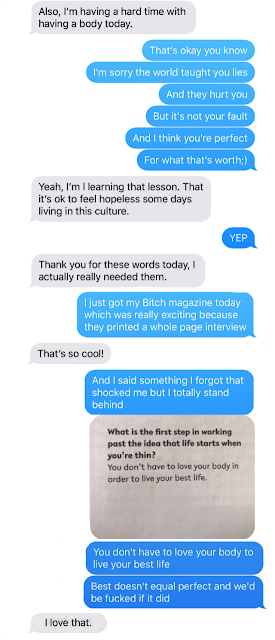Why I've Chosen Body Liberation Over Body Love
(Originally published in Landwhale: On Turning Insults Into Nicknames, Why Body Image Is Hard, and How Diets Can Kiss My Ass)
My blog headline (and personal messaging) changed several years ago from "Lose the Bullshit. Love Your Body" to "Lose the Bullshit. Liberate Your Body." This was a purposeful word change that, to this day, I still support wholeheartedly.
I’ve long preached the importance of body love, the proposed goal of falling head over heels with your physical appearance and celebrating it for how it looks regardless of how it fits (or doesn’t fit) into society’s definition of beauty. Body love asks you to achieve a 180-degree mental change; instead of “hating” your physical self, it insists that you can adore it for the way it looks regardless of what others may say.
In theory, it’s a lovely thought—worshiping your body because it’s yours, because our beauty-centric culture is designed to be exclusive—to reject complete assimilation seems like the ultimate victory.
What I have come to realize, though, is that asking someone to achieve body love can quickly become another unattainable prerequisite, much like the desire to change our body into what is deemed desirable.
When we focus solely on learning to “love our bodies,” there is a possibility that we are simply replacing the obsessive hatred around them with an equally obsessive love.
And hell yeah! That’s progress, right? Love is so much more desirable than hate; trading one negative emotion out for another more positive feeling is a glorious stepping stone.
But body obsession is still body obsession.
The popularity of body positivity over the last few years has morphed into something I often refer to as Lisa Frank BoPo: a strain of rainbow-colored body empowerment, covered in sparkles, which is purposefully vague so that it ignores larger body issues like racism, ableism, and the inaccurate equation of fat equaling unhealthy. Its messaging reflects the fuzzy feeling you get when remembering your Trapper Keeper, covered in adorable technicolor leopards, from elementary school.
In this way, it completely ignores the reality that even though we do have enormous power over our thoughts and can change the way we view our bodies, therefore changing social norms, we still live in a world that challenges (and actively attacks) our power every single day. It takes that fact and tries to distract you with something that has “more positive vibes,” not making space for daily issues that marginalized bodies face no matter how many inspirational quotes they read.
Because we live in this world, we cannot realistically escape this bigotry (which manifests itself for fat bodies in lack of health care, inaccessible cities and events, harassment, the tragic act of suicide and more).
To propose that you absolutely can love your body, and if you don’t it’s because you’re not trying hard enough makes those who are affected by oppression daily feel like they’re somehow failing at this movement that is allegedly supposed to offer freedom.
It’s not always possible to love your body. And it’s not something I want to ask of anyone any longer.
I have been working instead on using language that respects and acknowledges these very real barriers and find myself feeling more at home with the concept of “body liberation.”
Today I had a conversation via text with a good friend and this concept really hit home for both of us:
"Body love" comes with responsibility.
It, in essence, holds you responsible for your willpower or lack thereof. It puts the onus on you to master the ability to unlearn old lies. It binds us with the opposite requirements of self-hatred, but it’s still binding us. When we tell each other to love your body and with the implication that if you don’t, you just need to try harder. We’re not necessarily empowering anyone; we’re just regurgitating logic we learned from weight loss and from diet culture.
Liberation is freedom from all outside expectations, even our own.
Liberation is not having to love your body all the time. Liberation is not asking permission to be included in society’s ideal of beauty. Liberation is bucking the concept of beauty as currency altogether. Liberation is recognizing the systemic issues that surround us and acknowledging that perhaps we’re not able to fix them all on our own. Liberation is personally giving ourselves permission to live life.
Liberation is slowly learning how to become the best version of our whole selves—body included, yes. But it is no longer a requirement on our checklist of self-improvement to learn to love it.
In the end, I have found that the less I try to force myself to love my body, the less I hate it.
That, for me, is all I can ask for.


